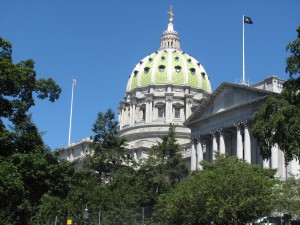Budget talks heating up severance tax debate in Harrisburg
-
Katie Colaneri
Facing down a large state budget shortfall and a July 1 deadline, Pennsylvania lawmakers are putting all of their options on the table – including a severance tax on natural gas production. Meanwhile, the mounting budget pressure has both sides of the severance tax debate vying for public support.
On one side are boosters of natural gas development who say additional taxes could force the industry to leave Pennsylvania. On the other side are Democrats and some Republicans searching for a way to plug the budget hole.
A new poll released Tuesday – commissioned by the Marcellus Shale Coalition, an industry trade group – shows general support for a severance tax among Pennsylvania voters. Fifty-five percent of respondents said they are in favor of a tax, while 34 percent oppose it.
However, the survey shows most voters (57 percent) would not support a tax if the revenue generated would pay for public employee pensions or if it resulted in Pennsylvanians losing jobs (58 percent).
In a statement, MSC president David Spigelmyer criticized what he called “misguided and short-sighted” policies that would increase taxes and fees and threaten the industry’s future in Pennsylvania.
“This research further demonstrates that bad policy is bad politics,” Spigelmyer said.
The poll was conducted by Boston-based Anderson Robbins Research from June 6 through June 8. It follows an analysis by the left-leaning Pennsylvania Budget and Policy Center released on Monday calling for a five percent severance tax.
Using data from the state Department of Revenue, the PBPC claims that drillers paid modest corporate net income taxes as shale gas production has soared since 2008.
“Gas drillers do not have an onerous tax burden in Pennsylvania that should excuse them from paying a reasonable severance tax,” said executive director Sharon Ward in a statement.
StateImpact Pennsylvania partner witf has reported that a severance tax, once a nonstarter in the Republican-controlled legislature, is slowly gaining GOP support:
Some Republicans see a political benefit to passing an extraction tax. More moderate Republican Senate and House members, especially in the southeastern part of the state, see it as a way to score with their constituents. Other GOP members see it as a way to take some air out of Democrats’ sails. Tom Wolf, Governor Tom Corbett’s Democratic opponent in the general gubernatorial election, is campaigning on a spending platform that depends on an extraction tax.
Incumbent Governor Tom Corbett opposes a severance tax, arguing it would hinder the growth of the state’s booming natural gas industry. Rather, Corbett supports the current impact fee charged for every well drilled. The fee has generated $630 million in the last three years.

















